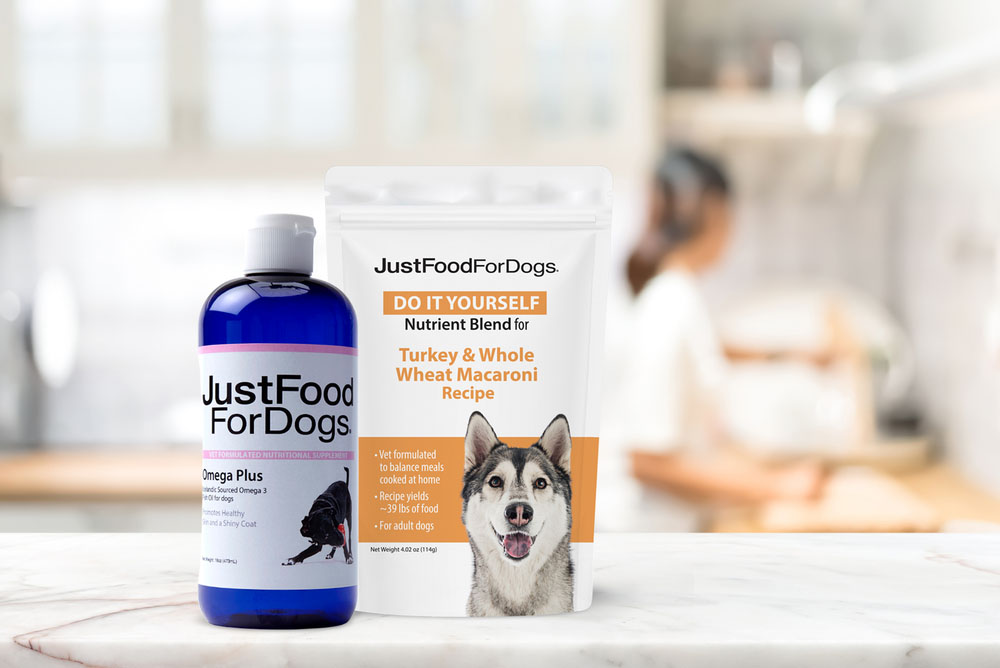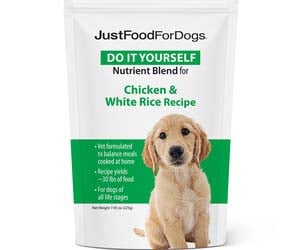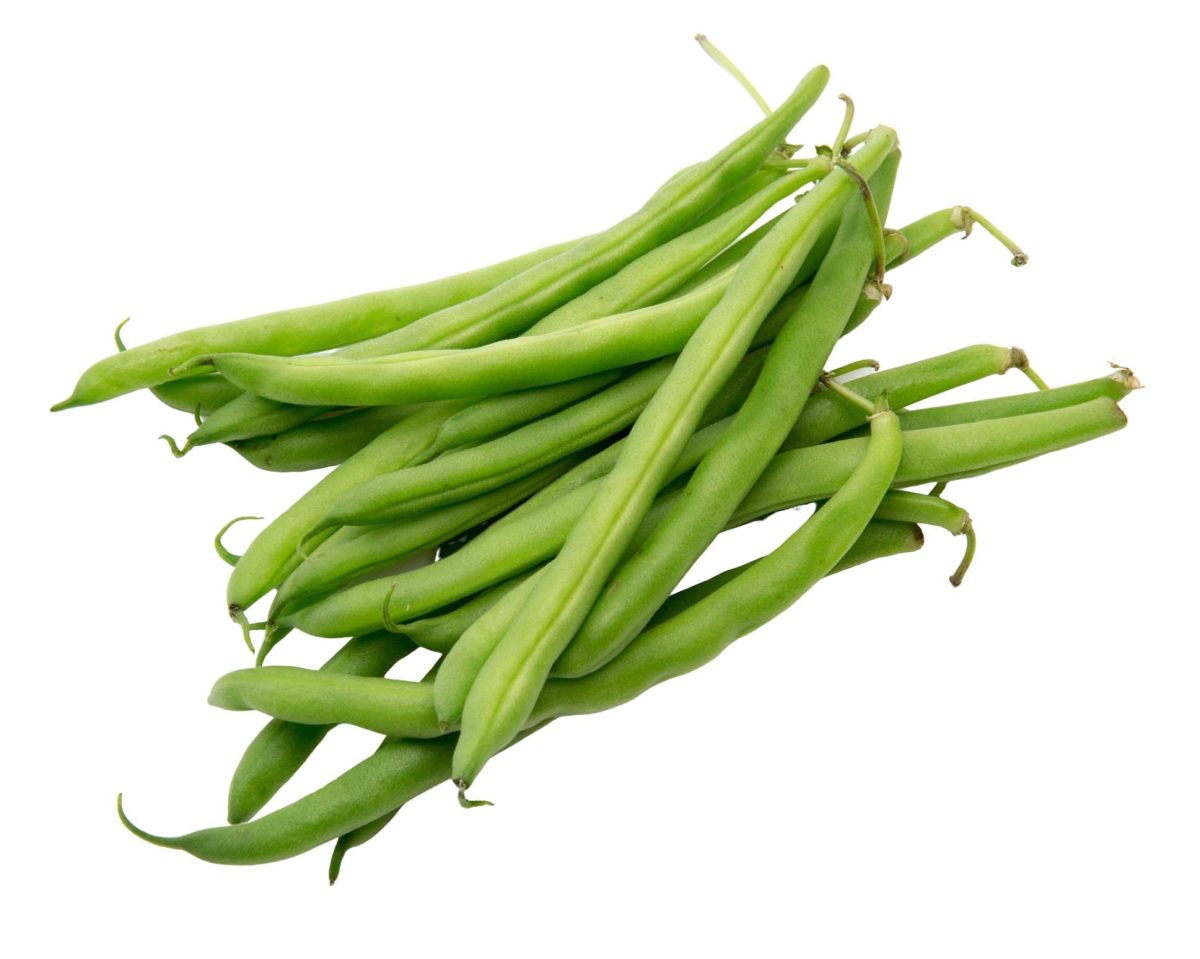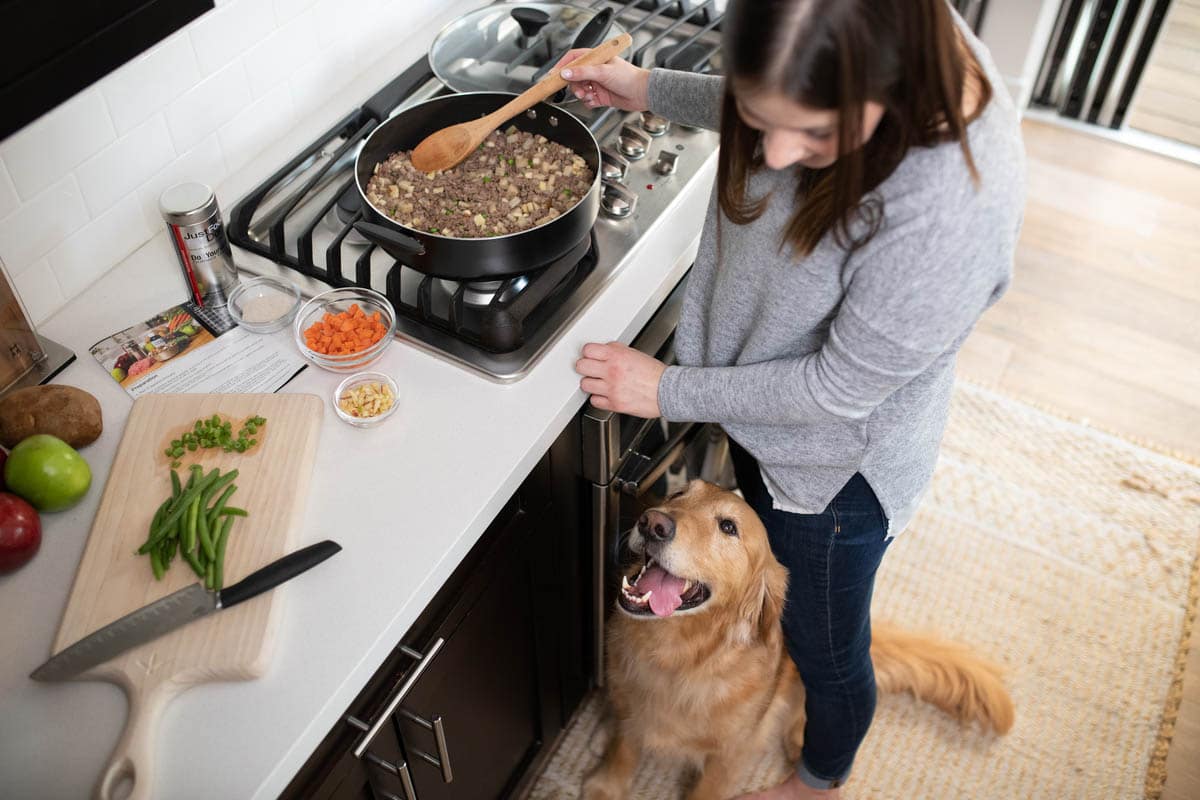Dog Supplements for Homemade Food
When making your own dog food, it is vital to get it right. Dog supplements for homemade food are essential for a complete and balanced meal.
In recent years, many pet parents have ditched commercial dog food for making DIY homemade dog food for their beloved furry friends. They want to make sure their pooch is getting a diet that is made from wholesome ingredients.
While that’s understandable, it’s important to consult with a board-certified veterinary nutritionist to ensure that the diet you’re making for your best buddy contains everything he needs to be healthy and happy.
As a part of that conversation, it’s likely you’ll talk about supplements that you might include in your homemade dog food recipes. So what makes for a high-quality, balanced diet for your pooch and what role will supplements play? How can you ensure you’re meeting his dietary needs?
Are Homemade Dog Food Supplements Necessary?
Just like humans, your dog needs vitamins, minerals, and other organic compounds to ensure he has a good diet and won’t have health problems because of what it is or isn’t eating. If you’re preparing homemade meals for him instead of kibble, you will need to ensure he’s getting all of the essential vitamins and minerals his body can’t produce.
If you’ve chosen to start making homemade dog food as a result, you want to make sure you’re providing the complete and balanced nutrition that can help him avoid any health concerns. After all, like any member of your family, your dog’s health is a priority.
However, making pet food can be time-consuming and confusing. Supplements can help ensure you’re including everything your best friend needs to have a robust immune system, healthy joints, and strong muscles.
You want to make sure you’re giving him everything he needs to grow and thrive. Like human foods, your dog food recipes need to provide your dog with all his nutritional needs.
What Vitamins and Minerals Should a Homemade Dog Food Recipe Contain?
According to AAFCO and the National Research Council, a balanced diet for a canine needs to contain the following important ingredients:
Protein
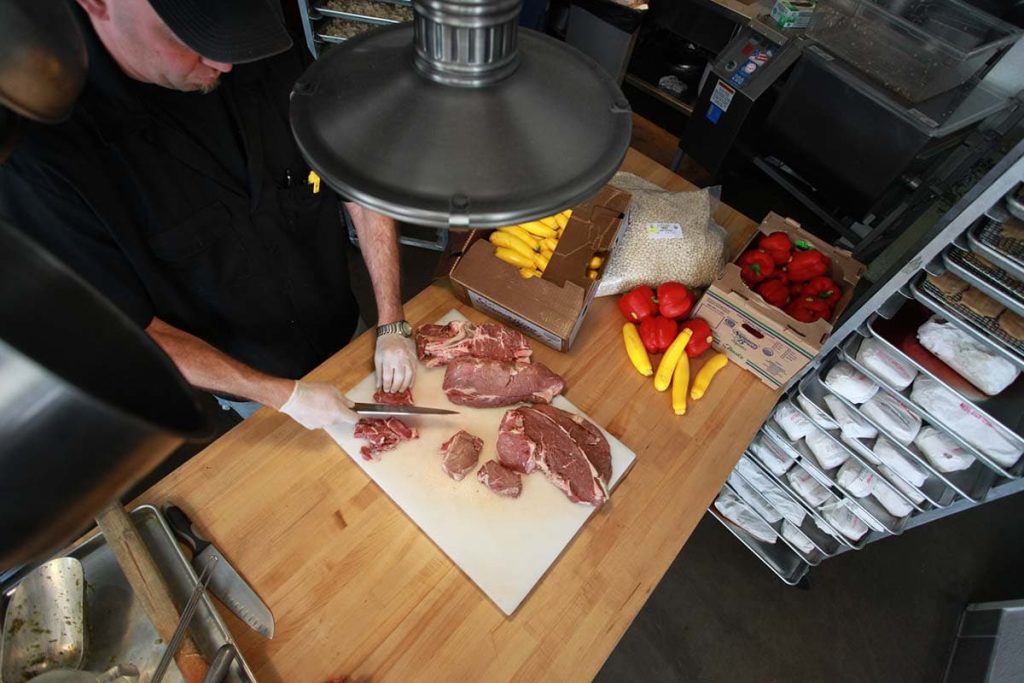
Protein is necessary for a number of vital functions in the body. It is required to create glucose, which will then be turned into energy. Your dog needs no less than ten specific amino acids that his body cannot produce.
The sources of protein for your homemade dog food recipe could be chicken, turkey, beef, lamb, pork, salmon, and other types of fish like whitefish, herring, walleye, and flounder. Of course, you want to make sure you remove any bones.
Fats and Fatty Acids
While we humans are accustomed to hearing about the bad side of fats, there is a good side. In moderate amounts, healthy fats and fatty acids, like omega-3 fatty acids, can support your dog’s skin and coat to keep them healthy. Additionally, fatty acids are necessary for the function and structure of cells.
Moreover, certain fatty acids, like eicosapentaenoic acid (EPA), docosahexaenoic acid (DHA), and linolenic acid (ALA) may help to counteract cardiovascular diseases by regulating antioxidant potential and inflammatory reactions.
You can see, therefore, that finding good sources of fatty acids is an essential part of your dog’s diet. The sources of healthy fats and fatty acids include certain plant-based oils like canola oil, soybean oil, flaxseed oil, sunflower oil, safflower oil, and fish oil.
Carbohydrates
Carbohydrates can provide a wide array of valuable nutrients and dietary fiber. They are important for generating energy, and they are good sources of dietary fiber, which is important for digestive health. Sources for healthy carbohydrates include brown rice, pasta, quinoa, oatmeal, and even sweet potatoes.
In fact, sweet potatoes are a good treat for dogs since they are a source of several vitamins and minerals, including vitamins A, C, B6, potassium, calcium, and iron.
Vitamins
Just as in humans, vitamins are necessary for healthy growth and maintenance of tissues. Deficiencies can result in several health issues, and for some vitamins, too much can also cause problems.
Dogs require the following vitamins:
- Vitamin A — sources include carrots, liver, sweet potato, broccoli, and pumpkin
- B vitamins — sources include meat, liver, green vegetables, and whole grains
- Vitamin D — sources include liver, fish, and beef
- Vitamin E — sources include leafy green veggies, liver, bran, and plant oils
- Vitamin K — sources include liver and leafy green vegetables
- Choline — sources include liver, fish, meats, and egg yolks
You might wonder if you could just give your dog a multivitamin. Consult with your veterinarian or board-certified veterinary nutritionist before adding a multivitamin to your dog’s diet. While many homemade diets are not appropriately balanced without supplemental vitamins and minerals, not all multivitamins are appropriate for our canine friends. For instance, some human multivitamins may have too much vitamin D for most dogs and could pose a risk for toxicity if used incorrectly.
The idea is that you should provide him with those vitamins and minerals with your home cooking. But if you’re unsure if you’re providing everything your dog needs, then it might be necessary to give him a multivitamin or other types of supplements.
Minerals
There are 12 essential minerals that your dog needs as part of a balanced diet. Here’s the list and some healthy sources:
- Calcium — sources include tofu, green beans, broccoli, and cauliflower
- Phosphorus — sources include meat and eggs
- Magnesium, potassium, sodium, and chloride — sources include fruits, vegetables, and whole grains
- Manganese — sources include meat, fish, and molasses
- Iron — sources include red meats and poultry
- Iodine — sources include dairy, kelp, and seafood
- Zinc — sources include eggs, lamb, liver, and brewer’s yeast
- Selenium — sources include meat, vegetables, brown rice, and seafood
- Copper — sources include whole grains, seeds, and seafood
Water
It’s also worth noting that water is an essential part of your dog’s healthy diet. No dog food contains enough water for your dog, so it’s vital to always ensure he has access to clean, fresh water.
When Do Dogs Need Supplements?
Even the best homemade whole-food diets can be missing certain vitamins and minerals. This is where supplements may come in handy. Additionally, dogs with a high activity level, such as herding dogs, or dogs with special needs, such as senior dogs, can benefit from certain supplements, like joint supplements for example.
Of course, as with anything dog owners add to their dog’s homemade food, it’s essential to consult with a veterinarian or veterinary nutritionist prior to giving him any new food. They can help you determine the best supplements to add and advise you on what to look for to know they’re helping.
Here are some supplements that many people may find helpful for their dogs:
- Joint supplements like glucosamine and chondroitin to support joint health
- Coconut oil for a shiny coat and to help with unpleasant body odors
- Folic acid for healthy metabolism and red blood cell production
- Prebiotics and probiotics to support a healthy digestive system
How Do You Choose Dog Food Supplements?
The first thing to do is talk with your veterinarian to help determine which nutritional supplements to use and at what dosage. Whatever you do concerning your dog’s diet, it must be vet approved. Here are some other tips:
- Choose brands that have clinical studies for their products
- Read the label to ensure they are of high quality and safe
- Make sure there’s a lot number — that indicates the company uses quality control
- Make sure there were experts involved in the production of the supplements
- If it sounds too good to be true, it probably is — no supplement is a cure-all
- Don’t give your dog human supplements or human food — many of the things humans can eat are harmful to dogs
- Check with your veterinarian for what supplements are appropriate and safe for your pet
The bottom line is before introducing homemade dog food supplements to your pet’s diet, check with your veterinarian and or veterinary nutritionist.
Try a Pre-Made Nutrient Blend
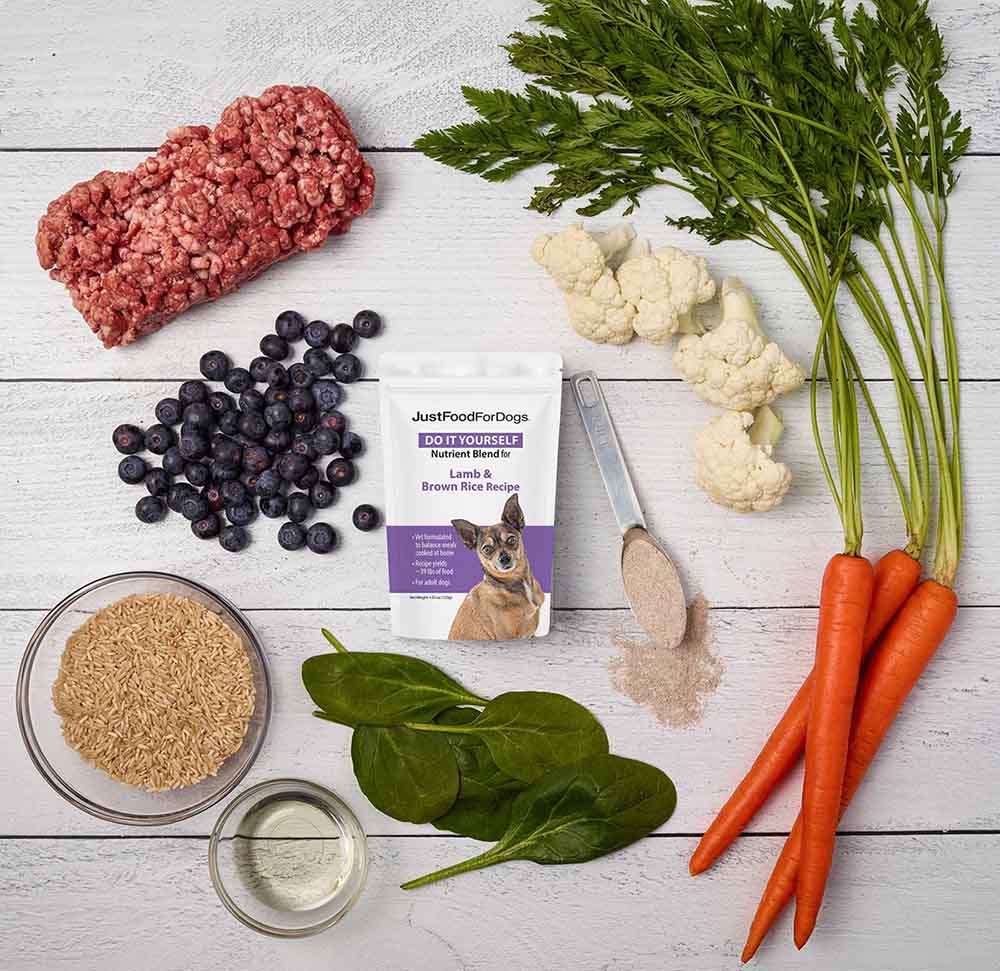
If pet owners are looking for top-of-the-line, preservative-free nutrient blends and dog food supplements made with whole food ingredients and backed by a team of veterinary nutritionists, look no further than JustFoodForDogs. Our mission is to provide your dog with high-quality, human-grade nutritional ingredients to meet his every need.
We work with a team of veterinarians to ensure that every recipe we create has your dog’s health as priority number one. We strive to ensure our recipes include the essential nutrients, and that we can help you address any health condition your dog might have.
So if you’re looking to supplement your dog’s homemade diet with a high-quality, well-researched line of over-the-counter supplements, take a moment to look at what we have to offer. The fresh food movement could change your dog’s life. We’re in it for your pet’s health!
This content is for informational use only and does not replace professional nutrition and/or medical advice, diagnosis, or treatment. It is not a substitute for and should not be relied upon for specific nutrition and/or medical recommendations. Please talk with your veterinarian about any questions or concerns.
Gawron-Skarbek, Anna, Agnieszka Guligowska, Anna Prymont-Przymińska, Dariusz Nowak, and Tomasz Kostka. 2023. “The Anti-Inflammatory and Antioxidant Impact of Dietary Fatty Acids in Cardiovascular Protection in Older Adults May Be Related to Vitamin c Intake.” Antioxidants 12 (2): 267. https://doi.org/10.3390/antiox12020267.
“Folic Acid.” n.d. Vca_corporate. https://vcahospitals.com/know-your-pet/folic-acid.
